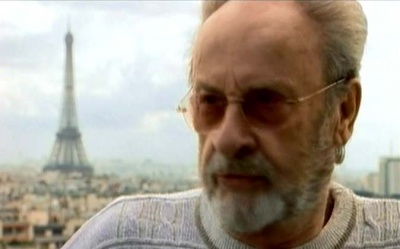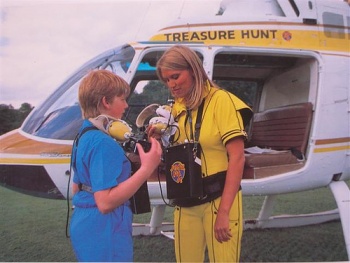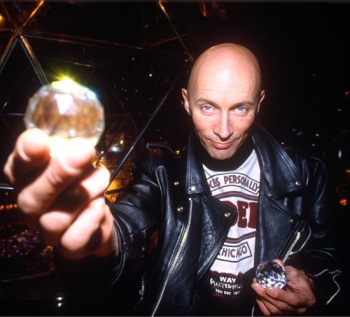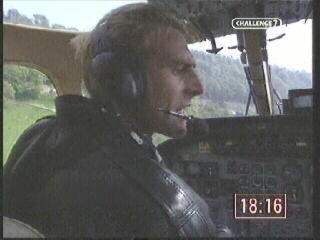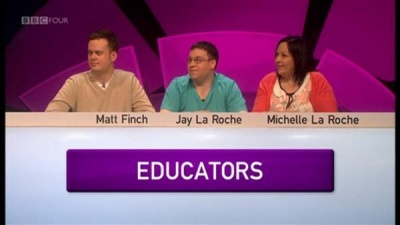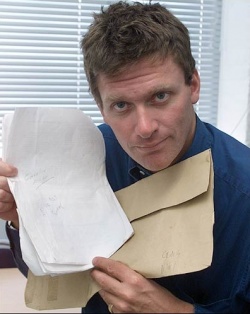Weaver's Week 2012-09-23
Last week | Weaver's Week Index | Next week
If you want a decent obituary, write it yourself. Outside of the game show world, we're yet to see an English-language tribute to this week's subject.
Here's a thing. Without Jacques Antoine, we reckon ukgameshows.com as we know it would not exist. David Bodycombe, the site editor, got into game design by sending in a puzzle for The Crystal Maze. Nick Gates, our most prolific reviewer, was inspired by all of Antoine's work, and has written a heartfelt appreciation of his own. We can't beat Nick's work as a retrospective of a career, so we're taking a more discursive approach.
From a British perspective, what did Jacques Antione leave us? Take Chasse au Trésor and its subsequent developments, including the British version Treasure Hunt. Here, some studio-bound contestants solve riddles and give directions to someone in a helicopter. It's a tremendously simple idea, and the execution isn't much more complex: people in a studio, different people in the field, and while the viewers will see events from both ends, the two sides aren't in visual communication during the game.
The selling point of Treasure Hunt was the journey. Not just the scenery, though the locations were often chosen to look good on the screen. No, the main point was getting the skyrunner to do something audacious, something unusual, something out of the ordinary. Anneka Rice or her substitutes would be required to make a loaf of bread, or dive with seals, or be slapped around the face with a beer-soaked rag, or take part in a scrum with a rugby team. The show worked as a spectacle, and as entertainment.
Treasure Hunt was a good example of an idea recurring through Jacques Antoine's career: that individuals made up a team, and that a team was composed of individuals with their own talents and specialities. In Treasure Hunt, the individuals in the studio were provided with all the useful reference materials to answer the riddles. But they couldn't complete the hunt, because they were stuck in the studio. Anneka was out in the real world, she could move about, but the only reference material she had was in her head, and that was usually full of the songs she could sing.
Another highlight of Antione's career was the French programme La Tête et Les Jambes (literally, The Head and The Legs), which put together two strangers. One was the brains, to answer knowledge questions. The other was the physical expert, set stunts of increasing difficulty based on the failures of the brains. Two people with individual skills, combining them in unexpected ways.
After Treasure Hunt came Interceptor, which took the separation of responsibilities a bit further. The blue player was set a course that would take them to the yellow key; the yellow player was set a course that would allow them to collect the blue key. All the players had to do was follow the courses, collect the keys, and carry on until they meet up. There was a spoiler in the way, the completely over-the-top Interceptor, as contact with this player would result in certain failure, and the risk of meeting Interceptor might lead the players to run out of time. For various reasons, the programme wasn't renewed, but remains one of the cult classics of British game shows.
And then we move to 1990, and the intertwined stories of The Crystal Maze, and its direct parent Fort Boyard. Between them, they've run for twelve series on British television, with another run of Fort Boyard in the works. Both shows were for a single team, but the various challenges were faced by individuals, not the whole team. In theory, the challenge was to use the various team-members in the most productive way, putting the physical specialist on games challenging physique, and reserving the sharp-shot for more skilful situations. In practice, the decision of who plays is taken by the producers, perhaps diluting our theory for the benefit of better television.
It would be wrong for us to suggest that there was one concept running through Jacques Antoine's career. There's a whole film career in the 1950s, which on its own would be enough to ensure his career was notable. There was Le Francophonissime, a game about words and their meanings, made with various francophone broadcasters around the world.
He created Le Schmilblick, which was basically the "What is this object seen from an unusual angle?" round from Ask the Family turned into a prize game. There were French versions of Celebrity Squares and The Dating Game, and a touring programme of parlour games. Again, there's a tenuous link, many of Antoine's works didn't need to be kept in a studio, they could be transplanted to wherever the viewers were. There's a certain thrill in seeing your village on television, having broadcasting made from your own back yard. Whether it's the team from Le Schmilblick setting up in the back yard of a school, or Suzi Perry literally dropping in and running about, Antoine's programmes went where the viewers were.
Speaking to the France Soir newspaper earlier this year, Jacques Antoine said that he didn't plan his life to create game shows, it was where he found his talents to lie. His approach was to treat the television programme as a play, following the fundamental rules of drama. Shows with a beginning, and a middle, and an end. Shows with character development, so that we could see the contestant who was a bit useless in Aztec zone redeem himself in Mediaeval, and triumph in Industrial. Shows with pace and verve and that built up to a natural climax.
Antoine's career was more than games, it was lively and varied and ceaselessly inventive. He wasn't in the habit of looking at his own programmes, perhaps fearing that he'd spot so many holes that there could never be another series. Before his death, he said that he was writing a book about his experiences in the television and film industries, and – if it's ever published – we've no doubt that it'll be a fascinating read.
Olivier Minne, the host of the French edition of Fort Boyard for the past decade, described Antoine as « au plus grand créateur de jeux de la télévision » – the greatest creator of games on television. We can't disagree. Antoine's programmes were always inventive, they would take us places we didn't expect to go, perhaps didn't even know that we could go. Amongst his later works, the British version of The Desert Forges was beautiful and clearly had a story behind it, even though we couldn't quite follow it ourselves.
We mourn the passing of Jacques Antoine, the end of a life is never a joyous event. Our lives are changed by his passing; our lives were changed by his living. In the fullness of time, we will remember his life as a time of doing, one full of achievement.
Only Connect
Heat 4: Wordsmiths v Educators
Onwards, to another show that takes groups of people, pools their talents, and allows us to see what they can accomplish together. We learn that Chris Brewis of the Wordsmiths once came second in a Rab C. Nesbitt lookalike contest, and the Educators are all modern languages teachers.
The Educators kick off with the picture clues, and suggest that everything they see is Russian. No, but the Wordsmiths have noted that all the words end in "__ova". A list of plays for the Wordsmiths, and it takes 37 seconds for them to realise that the title characters are never on stage. The Educators take a P, with four uses for human urine.
The Wordsmiths have descriptions of paintings, and buzz in after three clues – "paintings by Van Gogh" is not precise enough, the Educators take a bonus of "Van Gogh self portraits". Harsh, but fair. Music for the Educators, and there's some disco, Sinatra singing "Mack the knife", something sung by Paul Weller, and "Grenade". Which means it's weaponry in the title – "Eton rifles" and "Machine gun" the other two, and a good point. The Wordsmiths buzz in after two clues for some musical mnemonics, and this time it's good enough. At the end of the round, the Wordsmiths lead 5-3.
Into Connections, and Educators have some circles. Mastercard, Rubik's Magic (and we claim three points), Audi, so the London Spectacle flag is good for two points – it's increasing numbers of overlapping circles. A lovely sequence for the Wordsmiths: 7000 » 13 » 8 » 5 » 4. Or "seven thousand" » "thirteen" » "eight" » "five" » "four". A bonus for the educators, as they can count letters. If 4 is Titov, we claim five points with 1 Gagarin, the first four men into space; the Wordsmiths pick this up for a bonus.
Victoria's book from a few years ago "For richer, for poorer" is the subject of the first picture, followed by "In sickness and in health", which is going to lead via "To love and to cherish" to "Till death us do part". Three points to the Linguists. Both teams spot the next sequence is something to do with beer, but neither of them knows that after "wort" comes "beer". The Linguists get capitals on the Danube, and seeing as how Bratislava is clearly upstream of Belgrade, it's Vienna next. Two for them, and the Linguists lead 11-6.
"If you're easily bored, grids 183 and 184 are on the website." The Wordsmiths get first crack, and they have some European currencies, and Punt and Dennis in adjacent squares. So the currencies absorbed into the euro come out, followed by sorts of campaign. Regulars on The Now Show are the third group – Punt has gone into the currencies – but the team is a little stumped by the final connection. "Designers" is the one they plump for, completely wrong. Common medical tests is the answer they were never going to get. Seven points!
Something new for the Educators, and they go hell-for-leather through city squares, of which there are about seven on the grid. Then they get distracted by "Oak Apple", and what's the difference between that and "Attack poodle"? Yes, there's four squares in there – have they tried Red Square? Is there a St Peter's Day? Are they going to get anywhere at all through random jabbage? No is the answer to all of those, and the grid remains stubbornly unresolved. Which connections? They knew about the city squares, they stumble to Days, and get people who had famous brothers – ones who killed them, in fact. Terms of endearment amongst politicians – "Wet" and "Pinko" – evade them. Three points!
The Wordsmiths take an 18-9 lead into the final round. Educators take "bedclothes" 2-0, and "Careers that Barbie has tried" 3-(-1). This game ain't over! "Architectural features" goes to the Wordsmiths 2-0. "Eurovision-winning acts" is to the Educators 2-0, they just miss getting Lordi, but it wouldn't have changed the result – the Wordsmiths have won it by 19-16. Hard lines to the Educators, if only they'd done a bit better on the wall there.
This Week And Next
We must also report the death this week of Michael Hurll. He was a leading light entertainment producer for forty years, working on shows such as The Illustrated Weekly Hudd, Cilla, Seaside Special, and The Two Ronnies. He created Top of the Pops as it's generally remembered, and produced Crackerjack and The Two Ronnies until they finished. He produced the 1982 Eurovision Song Contest, worked on Little Noely's The Late Late Breakfast Show, Julian Clary's Trick or Treat, and founded the British Comedy Awards in 1990. His least well-regarded production was The Brits '89 with Sam Fox and Mick Fleetwood. Aside from the comedy awards, Hurll's final engagement was The Moment of Truth in 2001.
Michael Hurll had a long and varied career, and one filled with quality programmes. His quality was being decisive: making a decision and then sticking to it. He had the confidence to make great television, and – while not everything turned to television gold – we could always be sure his programmes would be bold and assured, that they had backbone and drive.
The long list of nominees for the National Television Awards has been published. We're not surprised to see The Voice of Holland UK join the fray in Most Popular Talent Show, as it was in April. We were mildly surprised to see Jimmy Carr up in Most Popular Entertainment Presenter. And our flabbers were truly gasted by one of the nominees in the Most Popular Entertainment Show – University Challenge? Entertainment? Thumper's hair will turn white from shock!
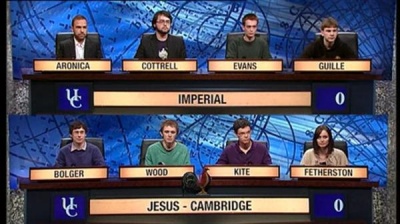 Imperial: Pietro Aronica, Dominic Cottrell, Martin Evans, Henry Guille
Imperial: Pietro Aronica, Dominic Cottrell, Martin Evans, Henry Guille
Jesus Cambridge: Alistair Bolger, Thomas Wood, Alex Kite, Nina Fetherston.
Week eight for University Challenge, Imperial College of London took on Jesus College Cambridge. Imperial took the first four starters, including one where Thumper gave every definition of "twitter" in the Oxford dictionary. Thumper, mate, microbloggage is so last year. When Jesus Oxford got their first starter, there was a tremendous cheer; they subsequently went on to remember Tim Berners-Lee, so no danger of employment at NBC. Jesus tried to name the composer of an opera in one note, and failed. This rather summed up the programme: Imperial was never challenged, and by the final five minute even the Jesus happy-clappers had quietened down to standard levels of applause. Imperial won by 225-80.
Mastermind was a game of two halves.
- Les Wallace (Extinct fauna of the Ice Age), an era when there were rhinoceri in the land, and not just on Radio 4. 12 (1) turns into 22 (4).
- Chris Kirk (General Custer and the Battle of the Little Bighorn) leaves the questions almost as dead as Custer's team, 13 (0). The general knowledge round is revenge of the toughies, only firing in the last half-minute. 22 (3).
- Hazel Humphreys (Dave Allen) goes vam-vam-vam through her round, 15 (0). Right from the start, it's clear the contender's in a bit of trouble, sighing and searching the lights for the answers. 22 (3) is her final.
- Malcolm Bradshaw (The Epsom Derby since 1980) almost has a perfect round – one error, 16 (0). Knowing he needs just seven to win, the contender knocks them off in short order. The registration executive finishes on 26 (2).
The Reunion: Big Brother aired on Radio 4 last Sunday. Craig, Nick, and Anna from the 2000 series were in discussion with Tim Gardam of Channel 4, and Peter Bazalgette of Endemol – both these men have now moved on to fresh challenges. The executives said that they never claimed Big Brother was a social experiment, so it must have been someone in the Channel 4 press office who coined that particular meme. We were reminded of the nightly discussion tasks, and we were not entirely surprised to hear Tim Gardam suggest that Channel 4 should have walked away from Big Brother many years before it did.
The programme's moderator, Sue MacGregor, made an entry into the Questions To Which The Answer Is No competition: "Jade Goody was told she had cancer on the Indian programme. Would that have gone out in the UK?"
And we enjoyed the lyric to Anna's song "It's only a game show", which we reproduce for posterity, and to amuse all the skateboarding lesbian nuns in our readership:
- It's only a game show / It's only a game show
- It's only a game show / It's only a game show
- It's only a game show / It's only a ga-a-ame show
(key change) (repeat all series)
Ratings in the week to 9 September, where our chosen unit of account is the Million Pounds Cash, calibrated to be worth 2.4m viewers. Neither BBC1 nor Channel 4 had any game shows in their weekly top 30. Top game show was The X Factor, its 8.05m viewers are worth 3.33 Million Pounds Cash. The Great British Bake Off had 4.7m viewers (1.95 MPC), and Red or Black? 2.0 returned 3.6m viewers (1.5 Million Pounds Cash). Minor Celebrity Mr and Mrs was seen by 3.35m (1.4 MPC) and University Challenge (2.6m viewers) beat both the Minor Celebrity It's Only A Game Show Big Brother final (2.4m) and Dragons' Den (2.15m).
All of these beat Celebrity Juice with 1.9m viewers, and Xtra Factor with 1.2m. Only Connect scored 855,000, barely ahead of the Celebrity Juice re-run on Saturday evening. New episodes of Deal or No Deal went out on More4, seen by 340,000. Masterchef Australia returned to Watch, seen by 130,000, and Fort Boyard Ultimate Challenge arrived on Disney XD, where 40,000 saw the show. That's (er) 17 Thousand Pounds Cash.
A quiet week for new shows: Never Mind the Buzzcocks returns (BBC2, 10pm Mon), and Jacpot returns to S4C (8.30 Fri). Next week's Week plans on going to the dogs.
To have Weaver's Week emailed to you on publication day, receive our exclusive TV roundup of the game shows in the week ahead, and chat to other ukgameshows.com readers, sign up to our Yahoo! Group.

